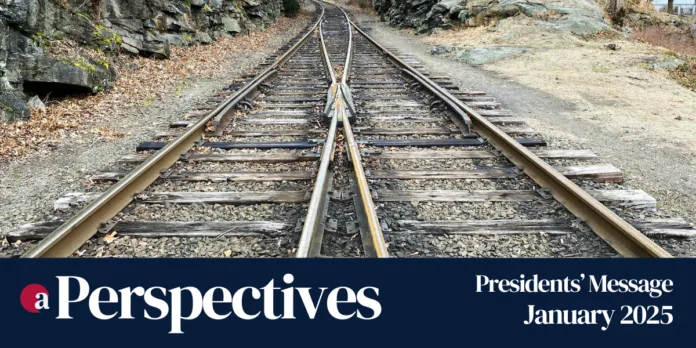

In a rapidly changing higher education landscape, collaboration is no longer just an option—it is a necessity. “Scraping collaboration” speaks to the intentional and persistent effort required to cultivate meaningful partnerships that elevate our work and benefit the students and communities we serve. This mindset requires digging beneath the surface, breaking down barriers, and unearthing opportunities for shared success.
How it Began and Where We’re Going
Several years ago, leaders of the Association of Fraternity/Sorority Advisors (AFA) and the Association for Student Conduct Administration (ASCA) made a concerted effort to build stronger relationships between our professional Associations, recognizing how stronger connections and a culture of not only collaboration but partnership between our members would only improve our the quality of our work and the student experience. These efforts led to multiple opportunities to learn from one another along with co-presenting at Association events. A few years later, AFA and ASCA memorialized our partnership by establishing a shared membership model and sponsoring programmatic efforts at our marquee Association events.
Our joint commitment to fostering safe, supportive, and values-driven student communities requires us to sustain these partnerships actively. Together, AFA and ASCA have the opportunity to transform how universities, inter/national organizations, and student communities function, collaborate, and thrive in ways that center transparency, meaningful learning, and sustained growth through our collective skills and tools.
Our FSL/Student Conduct Office Experience
Partnerships between Fraternity and Sorority Life (FSL) offices and Student Conduct offices, as well as between campuses and inter/national organizations, lead to more enriching student experiences. We’ve put together below (from our lived experiences) just a few examples of how we have effectively collaborated with our partner FSL/student conduct offices:
- Role model expectations through values-driven leadership and ethical decision-making
- Regularly offer listening sessions to student leaders to directly share what’s going well and areas of improvement for accountability processes.
- Involve students in developing dynamic accountability models where outcomes are adaptable to the evolving and unique needs of each student and student organization.
- Socialize communities to acknowledge and use FSL and student conduct offices as student resources that contribute to student and student organization success and,
- Embed restorative and trauma-informed practices, values-based leadership, and communal accountability into all aspects of student organization development.
- Create unified systems for sharing data and trends across institutions and organizations to inform proactive interventions and benchmark best practices.
- Joint Professional Development: Co-host and facilitate joint training sessions and other educational offerings that empower practitioners with various tools and methodologies.
Expanding the Impact of Campus and National Partnerships
Meaningful partnerships between campus and inter/national organizations can unlock innovative pathways for student success. By leveraging diverse perspectives and resources, we can collectively enhance student development and organizational health. These partnerships create the space for collaborative problem-solving and strategic alignment of values-based leadership initiatives we so desire in our organizations. When done intentionally, these partnerships become a cornerstone for advancing our collective mission to develop students into ethical, responsible, and engaged community members.
Innovative Solutions for Shared Challenges
The challenges we face—such as shifting cultural norms, increasing accountability demands, and resource limitations—require bold and creative solutions. Through strengthened campus and national partnerships, we can:
- Build collaborative investigation and sanctioning processes that leverage the strengths of each entity while maintaining consistency and fairness.
- Develop comprehensive support networks that include alumni, advisors, and professional staff to sustain organizational health.
- Pilot scalable initiatives, such as shared accountability frameworks or co-developed student leadership programs that address systemic issues while supporting local contexts.
Reimagining Priorities for Conduct and Accountability
Core Values for Transformation
- Proactive Prevention: Shift from reactive responses to proactive education and prevention strategies that build resilience and minimize incidents.
- Restorative Accountability: Center restorative practices that address harm while fostering growth and reconciliation.
- Equity and Inclusion: Ensure processes are equitable and inclusive, recognizing diverse student needs and experiences.
- Continuous Improvement: Establish mechanisms for ongoing assessment and adaptation to remain responsive to emerging challenges.
Commitment to Action
- Co-create frameworks that align institutional and organizational accountability goals.
- Elevate student voices in shaping conduct policies and practices.
- Invest in cross-association initiatives that advance diversity, equity, inclusion, and belonging in our communities.
Partnership is not just an option—it is the foundation for lasting impact. By working together, we empower students to thrive, strengthen the bonds of our communities, and set a higher standard for what collaboration can achieve. Let us all take this as an opportunity to lead by example. Reach out to your institutions’ counterparts, brainstorm partnership areas, and start/restart/retool conversations that pave the way for meaningful partnerships. Together, we can shape a brighter future for our students and our communities.




